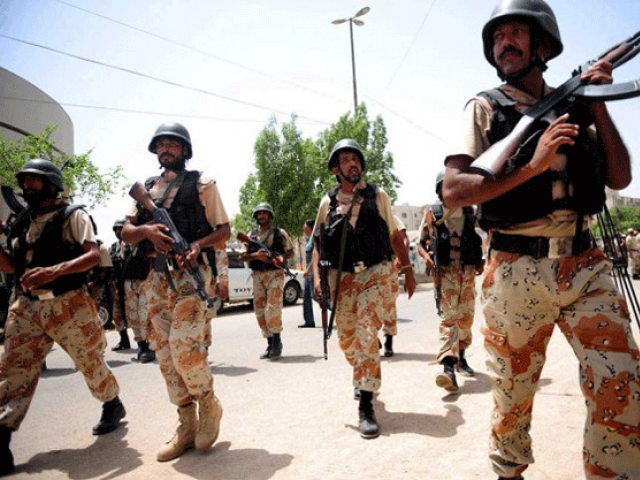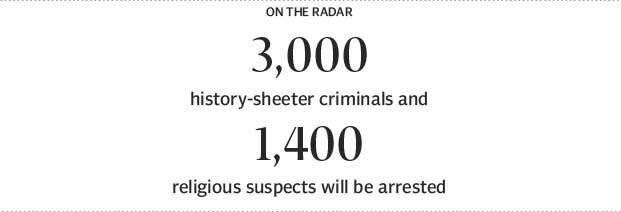Action begins: Uptick in sectarian violence spurs crackdown
Sindh government swoops down on 93 madrassas accused of harbouring militants

Paramilitary Rangers take action against the rise of Sectarian violence in Karachi PHOTO: AFP
The crackdown began before dawn on Sunday when police and paramilitary Rangers detained prominent Shia scholar Allama Mirza Yousuf Hussain in a raid on his house in the Nazimabad neighbourhood of the city. The law enforcers also searched two imambargahs – one adjacent to Allama Yousaf’s house and the other in Rizvia Society – and detained four suspects and seized some literature.
Top Shia cleric, 39 others arrested over involvement in Karachi sectarian killings
In the meantime, a police contingent searched Siddiq-e-Akbar mosque in the Nangan Chowrangi neighbourhood, which is considered the headquarters of the banned sectarian outfit Ahle Sunnat Wal Jamaat (ASWJ). The group’s secretary general Maulana Taj Hanfi and 10 other suspects were detained and shifted to an undisclosed location.

The arrests triggered protests from members of the two communities who staged demonstrations in Karachi and other cities.
The swoop came less than two weeks after a high-level security huddle was briefed about the activities of around 93 madrassas which, according to intelligence reports, have solid links with terrorists or banned outfits.
Geo-tagging of these madrassas has been completed and the chief minister [Murad Ali Shah] has asked police and Rangers to start a crackdown against terrorist elements, sources in the provincial home department told The Express Tribune.
A committee has also been formed under the supervision of AIG Counter-Terrorism Department Sanaullah Abbasi to collate a list of suspects who have recently travelled to and from Afghanistan, one source said.
“The Ulema [suspected of harbouring terrorists] and their seminaries will be put on the Fourth Schedule. These madrassas and their teachers will not be accorded any official security,” said a senior official while sharing details of the Oct 25 meeting at the CM House. The government has also decided to arrest 3,000 ‘history-sheeter criminals’ and 1,400 religious suspects who have recently been granted bail but don’t show up for court hearings. History-sheeter is a Pakistani police term for a criminal with a long record of serious crime.
“Please demolish the homes built around these 93 seminaries because they are sheltering terror suspects,” the official quoted the CM as directing the law enforcers.
The Rangers have largely restored peace in Karachi after a prolonged surgical operation, but the metropolis witnessed an uptick in sectarian violence since the beginning of Muharram. First a trustee of an imambargah was killed in a drive-by shooting in Gulstan-e-Jauhar on October 11. Minutes later another Shia community member Javed Raza Rizvi was killed in Gulshan-e-Iqbal. It was followed by a hand grenade attack on Imambargah in Liaquatabad on Oct 17 in which a 12-year-old boy was killed and 18 others wounded.
The deadliest attack took place on October 20 when gunmen riding a motorcycle killed five members of the Shia community in an attack on a majlis at a house in Nazimabad. Sectarian tension spiked when six members of ASWJ and JUI-F were gunned down in three different neighbourhoods of the city on Nov 4.
Rangers arrest two 'hitmen' involved in Karachi sectarian, political killings
Police doubts these killings were purely motivated by sectarian hatred. “Some third force might be involved in the ongoing wave of killings of Shias and Sunnis which wants to create sectarian discord in the city,” DIG Central Zulfiqar Larik told The Express Tribune. However, he wouldn’t name the ‘third force’.
Chief Minister Shah sought an explanation from top police officials for their failure to stem the tide of sectarian violence. “This shows slackness on the part of police which is why target killers flee unchallenged after killing people,” he said. The chief minister was, however, informed that the same group was involved in the killing of members of the two communities.
“The killers have used the same caliber pistols and only changed their motorbikes in recent targeted attacks,” AIG Mushtaq Mahr told the CM based on preliminary investigation. This couldn’t satisfy Shah. “I just want to know why police were not patrolling sensitive areas,” he told Mahr. “It’s surprising and alarming that the same criminals keep changing motorcycles and kill people without any fear of police and other agencies.”
Published in The Express Tribune, November 7th, 2016.



1724319076-0/Untitled-design-(5)1724319076-0-208x130.webp)















COMMENTS
Comments are moderated and generally will be posted if they are on-topic and not abusive.
For more information, please see our Comments FAQ